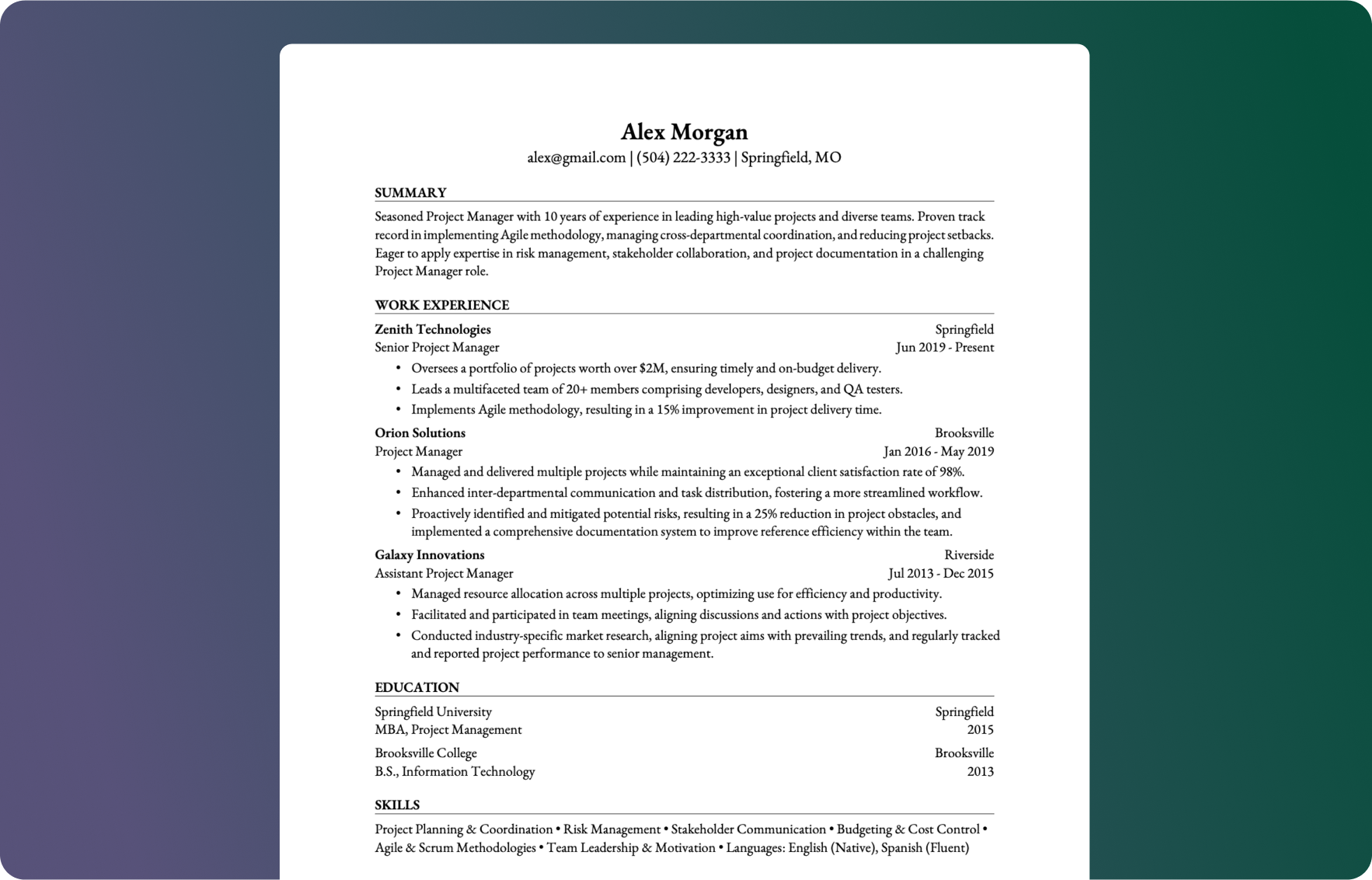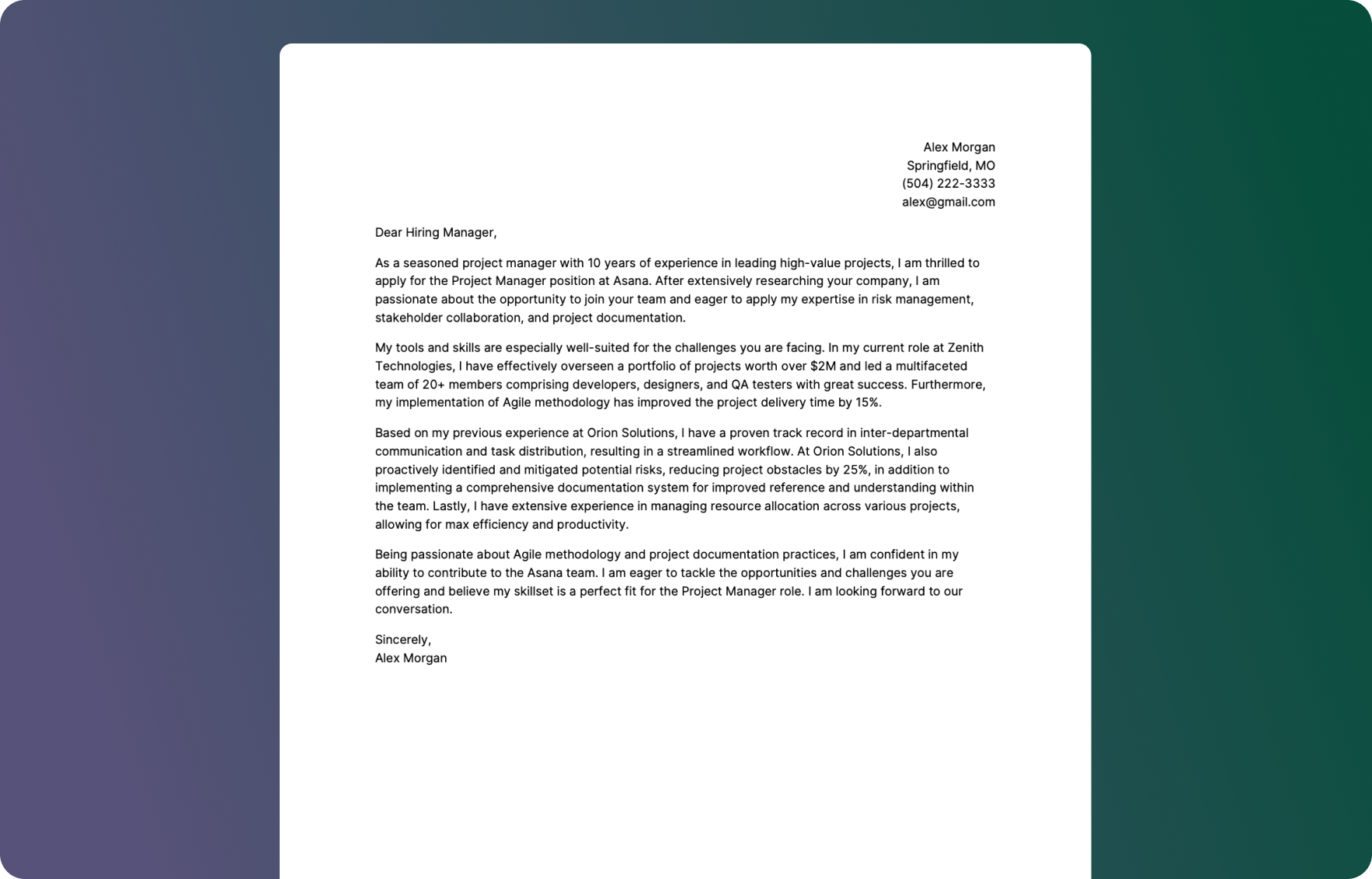Brief overview of the Project Manager position.
A Project Manager (PM) plays a crucial role in guiding projects from inception to completion, ensuring they are executed efficiently and meet the set objectives. Responsible for planning, organizing, and directing the completion of specific projects for an organization, a PM collaborates closely with cross-functional teams to define project scope, set deadlines, assign responsibilities, and monitor progress. Utilizing a blend of technical know-how and leadership skills, they are tasked with managing resources, budgets, and risks, all while ensuring stakeholders are kept informed and any roadblocks are addressed promptly. The success of a project often hinges on the PM’s ability to communicate effectively, solve problems, and adapt to changing circumstances, making them indispensable assets to organizations across various industries.
What are the skills and attributes that companies are looking for in project managers?
- Project managers play a vital role in ensuring the successful completion of projects, and as such, companies seek a combination of technical, soft, and industry-specific skills in potential candidates. Here’s a list of skills and attributes that are commonly sought after in project managers:
- Project Planning: Ability to outline the steps required to achieve the project’s goals.
- Risk Management: Identifying potential risks and creating strategies to mitigate them.
- Budgeting and Cost Control: Managing project finances and ensuring it remains within budget.
- Quality Management Ensuring the project meets the required standards and quality benchmarks.
- Familiarity with Project Management Software: Tools like Microsoft Project, JIRA, Asana, or Trello.
- Communication: Conveying information effectively across stakeholders, team members, and executives.
- Problem-Solving: Identifying issues and determining efficient and effective solutions.
- Time Management: Managing one’s own time and that of the team effectively.
- Adaptability: Striking a balance between the needs of stakeholders, team members, and the project.
- Negotiation: Striking a balance between the needs of stakeholders, team members, and the project.
- Stakeholder Management: Understanding and managing the interests and expectations of everyone involved in the project.
- Understanding of Project Management Methodologies: Such as Agile, Scrum, Waterfall, PRINCE2, etc.
- TCertifications: Certifications like PMP (Project Management Professional), CAPM (Certified Associate in Project Management), or PRINCE2 can be highly desirable.
Example Project Manager Resume
💡 Protip: EarnBetter has a free tool that can create a professional project manager resume for you. It’s free and it takes less than a minute to do - click here to get started today!
What keywords are most important to include in your application for a project manager position?
- When applying for a project manager position, including specific keywords can help your application stand out and be recognized, especially when companies use Applicant Tracking Systems (ATS) to scan resumes. Here are some important keywords to consider:
- Project Management
- Project Planning
- Risk Management
- Stakeholder Management
- Budgeting & Cost Control
- Agile or Scrum
- Quality Assurance (QA) / Quality Control (QC)
- Resource Allocation
- Change Management
- Timeline Management
- Leaderships
- Certifications such as PMP, CAPM, PRINCE2, or any other relevant credentials.
Example Project Manager Cover Letter
💡 Protip: EarnBetter has a free tool that uses AI to customize cover letters for specific jobs. You can get a professional cover letter tailored to a project manager role in less than a minute - click here to get started today!
What types of questions could I expect for a project manager interview?
When interviewing for a project manager role, you can expect a mix of general, behavioral, and role-specific questions aimed at assessing your skills, experience, and suitability for the position. Here are some common interview questions you might encounter:
- Question: Can you describe a project you managed from start to finish?
- Guidance: This question evaluates your experience and ability to oversee a project in its entirety.
- Sample Answer: "At Company X, I managed a project to upgrade our CRM system. I began with a needs analysis, secured budget approvals, selected a cross-functional team, and defined the project timeline. We faced challenges such as data migration issues and had to adjust our timeline slightly. However, through consistent communication and risk management, we completed the project within budget and increased our sales team’s efficiency by 25%."
- Question: How do you handle a team member who’s not contributing effectively?
- Guidance: This question assesses your leadership and conflict resolution skills.
- Sample Answer: "First, I’d initiate a one-on-one discussion to understand the reasons behind their performance. Sometimes it’s a skills gap, personal issues, or lack of clarity about their role. Depending on the root cause, I’d provide the necessary training, support, or clarification. If no improvement is observed, I’d then consider reshuffling team roles or seeking alternatives."
- Question: How do you prioritize tasks when managing multiple projects simultaneously?
- The interviewer wants to see your organizational skills and decision-making processes.
- Sample Answer: "I use a combination of tools and methodologies. First, I identify the critical path for each project. Tasks that are on this path get the highest priority. Secondly, I consider the stakeholders’ needs, project deadlines, and resource availability. Regular check-ins with my teams and stakeholders help adjust priorities in real-time."
- Describe a time when a project did not go as planned. How did you handle it?
- Guidance: This question probes your problem-solving skills and ability to adapt under pressure.
- Sample Answer: "In a previous role, a key vendor delayed delivering essential components, pushing our entire timeline back. I immediately informed stakeholders and began exploring alternative vendors. We also adjusted our internal tasks to progress without those components. Though the project faced a slight delay, our proactive steps minimized the impact."
- Question: How do you ensure clear communication among your project team members?
- Guidance: This question checks your communication strategies and understanding of its importance.
- Sample Answer: "Clear communication is paramount. I always kick off projects with an alignment meeting, ensuring everyone understands their roles, key milestones, and project objectives. Regular check-ins, both as a group and individually, help address concerns. I also use collaborative tools like Slack and Trello to maintain open lines of communication and document everything, so all team members are on the same page."
What is the average day in the life of a project manager?
An average day in the life of a project manager revolves around coordination, oversight, and ensuring that all project elements are progressing as planned. Their morning often begins by reviewing emails, checking project updates, and ensuring that there are no urgent issues that arose unexpectedly. They may then participate in or lead daily stand-up meetings with their team to discuss progress, obstacles, and next steps. A significant portion of their day involves liaising with different departments, stakeholders, or clients to provide updates, gather feedback, or seek approvals. They’re constantly checking the project timeline, ensuring milestones are met, and making necessary adjustments. Throughout the day, they might also address and troubleshoot any arising challenges, ensuring that risks are mitigated and the project stays on track. They often manage resources, budgets, and scope, making certain everything aligns with the project’s objectives. By the end of the day, they’ll review tasks completed, set priorities for the upcoming day or week, and often, update documentation or project management software to reflect the project’s current status. Amidst these tasks, a project manager remains vigilant, adaptable, and always ready to handle the unexpected.
What is the difference between a “project manager” and a “project coordinator”?
A project manager and a project coordinator play integral roles in the domain of project management but serve different functions. The project manager holds primary responsibility for the overall success and direction of a project. They have the authority to make pivotal decisions, set goals, manage budgets, and ensure the project adheres to its objectives within its scope, time, and budget constraints. Their gaze is firmly set on the broader picture, balancing elements like resources, risks, stakeholder expectations, and quality to guarantee the project’s successful completion.
On the other hand, the project coordinator acts as a supportive figure, aiding the project manager and the entire project team. While their role is crucial, it leans more towards the administrative and organizational side of things. They handle day-to-day operations such as scheduling meetings, updating documentation, ensuring timely communication among project participants, and tracking tasks to confirm they remain on schedule. Their focus is on the granular details, ensuring smooth daily operations and providing the project manager with the necessary data and resources to make informed decisions. Unlike the project manager, coordinators don’t typically possess the authority to make significant project decisions; instead, they concentrate on their specialized administrative tasks and defer larger project concerns to the manager.
In essence, while both roles are vital to the project’s trajectory, the project manager views the project from a high-level perspective, ensuring alignment with overarching goals, whereas the project coordinator ensures the day-to-day tasks and communications flow seamlessly, supporting the larger vision set by the manager.
What should I do if I want to become a Project Manager but don’t have much experience?
If you’re aspiring to become a Project Manager with limited experience, there are several steps you can take to make the transition smoother. Start by educating yourself about the fundamental principles of project management. There are numerous courses available online, like those offered by Coursera or Udemy, which can introduce you to methodologies such as Agile, Scrum, or Waterfall. Acquiring a certification, like the Project Management Professional (PMP) or Certified Associate in Project Management (CAPM), can also significantly enhance your credibility in the field. Concurrently, develop soft skills, such as leadership, communication, and conflict resolution, as these are pivotal in managing teams and stakeholders. To gain hands-on experience, consider volunteering in roles that involve organizing events or leading initiatives, even if they aren’t explicitly labeled ’project management’. Joining organizations like the Project Management Institute (PMI) can offer networking opportunities and access to resources. Seek out mentorship from experienced project managers; their guidance can provide insights that academic study might miss. Lastly, when applying for roles, emphasize any transferable skills from your previous experiences, like team coordination, budget management, or timeline oversight. Over time, with persistence and continuous learning, you can carve a successful path into project management.

